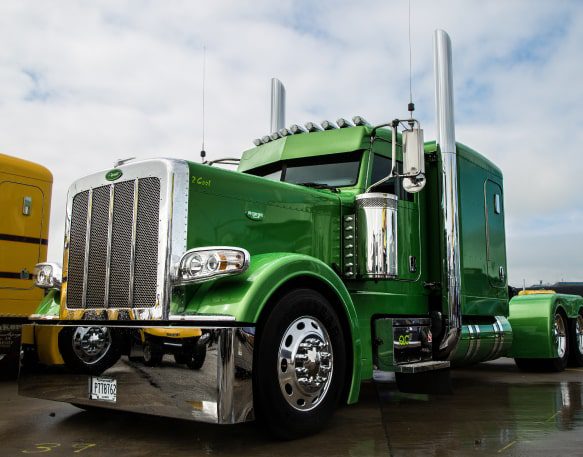Whether you’re brand new to the industry or you’ve been around for a few years, you’ve probably heard about freight brokers. They’re a vital part of the trucking industry—but what do freight brokers do exactly?
They’re in charge of connecting shippers with carriers, using data and insights to negotiate rates, and managing back-office paperwork—all while remaining fully compliant with various state and federal regulations.
However, it’s not just shippers that can benefit from working with a great freight broker. Carriers can save time and money by having a broker identify high-value loads for them. An experienced freight broker can also help carriers build long-lasting relationships, leading to steady, repeat business that sets them up for a healthy, enduring career.
No matter if you’re looking to become a qualified freight broker or are a carrier scouting for truck broker professionals who can help your business, DAT can help. On this page, you’ll learn what freight brokers do, how they become qualified to connect carriers and shippers, and how they can help carriers succeed in business—and you’ll learn about the DAT solutions that help truck brokers and carriers make the most out of their business.
What is a freight broker?
Freight brokers are a vital part of the industry. They connect shippers, or businesses with goods to move, with carriers that are ready and willing to transport those goods. Essentially, a freight broker is a middleman who coordinates the movement of freight between the shipper and the carrier, keeping goods moving seamlessly across the country and continent.
Shippers rely on a freight broker to help them get loads placed (particularly those loads that the shipper might struggle to get delivered on their own) and ensure products are delivered safely and on time. For example, a shipper may turn to a broker if all their contract carriers cancel, leaving loads that need to be moved ASAP, or they need access to trucks on notoriously difficult routes.
The freight broker can then tap into their network of carriers to find someone who is able to take on the load. At this stage, negotiation becomes essential. The broker must balance the shipper’s budget with the carrier’s rates to reach an agreement that satisfies both sides. Brokers consider factors such as the distance, load size, and urgency of delivery to determine a fair rate that keeps shipping costs manageable for the shipper and fairly compensates the carrier, which can foster trust and deepen relationships.
On the other hand, carriers depend on brokers to consistently locate high-quality loads that align with their available capacity, preferred routes, and payment requirements. With the help of a freight broker, carriers can find loads that fit their schedule, allowing them to make the most of their fleet. Brokers can also help carriers avoid deadheading, or driving with an empty trailer to pick up another load or return to their point of origin. Not only does deadheading waste a driver’s time, but it also wastes fuel, causes unnecessary wear and tear on the truck, and costs money.
Freight brokers will have gone through freight broker training, earned their broker authority, and have all the necessary skills and tools for matching shipper loads with carriers. As a result, they’re pros at effectively managing logistics and helping ensure that all parties experience smooth, timely deliveries and mutually beneficial agreements.
Beyond simple matchmaking, freight brokers often handle many back-office tasks, including paperwork, scheduling, and compliance management with state and federal regulations. By taking care of these logistical details, freight brokers allow both shippers and carriers to focus on their core operations. As a result, the entire freight process becomes more efficient for everyone involved.
What does a freight broker do?
Freight brokers have a lot on their plate and are vital to keeping the wheels turning smoothly in the logistics industry. A major part of the freight broker job description is to connect shippers and carriers, securing the best rates for both parties and ensuring that goods can move efficiently across the country. This means balancing a mix of relationship-building, negotiation, and logistics management.
But what do freight brokers do exactly? Some key freight broker job responsibilities include:
- Find shippers: One major part of what freight brokers do is finding shippers, which can involve networking, cold calling, and leveraging online platforms.
- Networking with carriers: Freight brokers must also connect with carriers, as shippers need someone to haul their loads.
- Build and maintain relationships: Freight brokers also need to nurture their relationships through consistent communication and reliable service to ensure they have a network of trusted partners they can depend on for future shipments.
- Connect shippers and carriers: Once a freight broker has established relationships with shippers and carriers, it’s time to match shippers who are looking to move cargo with carriers that have the needed capacity and equipment in order to bridge the gap between supply and demand.
- Negotiate rates: Brokers must serve as a middle ground between shippers and carriers, helping them reach a rate that is within the shipper’s budget and meets the carrier’s operating costs and profitability goals.
- Assist with logistics: Another key element of the freight broker job description is helping with logistics, which can include providing pickup and dropoff details, coordinating transit schedules, tracking shipments in real-time, managing route planning, and communicating any updates in a timely manner.
Freight brokers play a crucial role in keeping the logistics industry running smoothly by managing the complex interactions between shippers and carriers. Through a mix of networking, relationship-building, and logistical expertise, they create value for both shippers and carriers and ensure that goods can move efficiently from point A to point B.
Do carriers need to work with a freight broker?
While there are many instances where a carrier can work directly with a shipper, carriers often depend on a freight broker to make their lives easier. There are several reasons for this:
- Brokers have shipper relationships: Carriers often use a load board to secure loads to haul—and to find the most options and trusted partners, carriers and brokers turn to the DAT load board. This platform’s advanced search and filter features, along with its accessibility via the DAT One mobile app, make it a natural time-saver. In addition, carriers can find brokers with existing shipper relationships directly and can view credit score ratings, reviews, and more to make sure that they are only partnering with the most reliable businesses. Carriers can also let brokers come to them by posting their truck details.
- Brokers simplify the process of striking a balance between what carriers want and what shippers want: Carriers and shippers often come at things from completely different angles. Carriers generally want to make as much profit as possible, whereas shippers are often eager to find opportunities to cut costs. Of course, they don’t necessarily want the cheapest service provider on the market and the low-quality service that often comes at that price point, but they do prioritize controlling costs. Enter brokers. By purchasing a broker’s services, carriers can quickly arrive at a fair rate that satisfies all parties. Plus, if a carrier forges a strong, long-term relationship with a broker, they’re more likely to consistently earn a better rate than they would by seeking out a different broker for every load.
- Brokers handle key ins and outs of transportation: Even for independent owner-operators who run their own businesses, spending time searching for the perfect load and dealing with the logistics can get in the way of what will actually bring in profit: getting out there and hauling loads. When working with a freight broker, independent owner-operators are depending on someone who has a freight broker license and has likely participated in freight broker training online. As a broker for loads, they are building a business reputation based on the quality of their shipper-carrier matches. So, carriers can lean on a broker as they might lean on their own sales team. With a broker’s help, there’s no need to cold call shippers to find loads or dedicate hours to networking, leaving carriers with more time and bandwidth to focus on doing what they do best: hauling loads successfully and safely.
Why are freight brokers important?
Other benefits freight brokers bring to the transportation industry are flexibility, resilience, and speed. If shippers and carriers exclusively work in one-on-one ways, market condition changes could lead to many obstacles. It would be challenging to get loads hauled if specific lanes were clogged or a carrier became unavailable at the last minute.
People who are great at freight broker jobs secure the proper authority, undergo the right training, and study the market closely as they build their businesses. The best freight brokers for owner-operators have a track record of setting up a freight broker business that can handle trucking in any market environment.
How to become a freight broker
Becoming a freight broker takes time, but it’s well worth the effort. The broker start-up guide from DAT offers a detailed breakdown of the critical steps to becoming a freight broker. Here are some of the essential things all future freight brokers need to do:
- Establish a business: This requires freight broker hopefuls to set up a legal entity and complete the right documents to secure their operating authority.
- Find the right partners: Freight brokers will also need to decide on a BOC-3 process agent who will be available to them if their company ever faces a court case.
- Get the right risk-management protection in place: This is known as a trust fund or a freight broker surety bond. In the event the broker can’t satisfy contracts, this money gives shippers and carriers confidence that they’ll have money to cover them without a loss.
- Participate in training to get knowledge and skills: DAT understands how vital training is for developing talented freight brokers. Through our partner Freight 360, we provide comprehensive broker training with compelling video, text, and more across 40 lessons.
- Learn the ropes of establishing contracts and winning business: Truck brokers are responsible for detailed record-keeping, including contracts and receivables. To build a broker business, they will also need to establish shipper and carrier relationships. The DAT load board is among the best resources for finding qualified partners and getting loads hauled.
How much does it cost to become a freight broker?
The investment required to become a freight broker can vary, but it’s an essential step toward building a successful business in this rewarding industry. Securing a surety bond, a key part of the process, is an important upfront cost that demonstrates your reliability to clients. Investing in top-notch training, like Freight 360’s broker training, can also set you up for long-term success. Additional expenses, such as company setup fees and licensing paperwork, are part of establishing a strong foundation. Many aspiring brokers turn to service providers like DAT Authority to simplify the process, save time, and focus on growing their business with confidence.
When pursuing a high freight broker salary, it’s important to understand that the upfront costs can be substantial. At the same time, the ROI of entering this career with all the proper pieces in place can quickly pay down those costs, allowing those new to the business to begin to build a healthy bottom line as a truck broker. And, of course, the things people learn about how to become a freight broker along the way are priceless.
What tools will help freight brokers succeed?
To start, the first tool everyone needs is a load board for brokers. With the DAT load board, freight brokers can seek out carriers, including independent owner-operators. Freight brokers can use data-driven insights like market rate data, truckload pricing, seasonal trends, and much more. Study individual lanes or lanes within a region to determine how to get loads placed for shippers quickly and efficiently.
The second tool that can take freight broker training to the next level is a transportation management system, also known as TMS software. DAT Broker TMS is an all-inclusive platform that includes tools for managing finances, tracking loads, and studying carrier rates. Brokers save time and become more profitable with TMS software. Optional modules add new layers of visibility and analytics for any growing load broker business.
How do carriers find freight brokers?
Carriers often rely on freight brokers to help them locate quality loads and keep their trucks moving efficiently. They can connect with freight brokers through:
- Social media: Don’t underestimate the power of social media. Carriers can find freight brokers through social media networks, LinkedIn groups, and industry forums.
- Industry networking: Carriers can also connect with freight brokers in person through industry events, conferences, and associations.
- Referrals from others: Recommendations from other carriers or industry contacts are another reliable way carriers find brokers, especially those with a strong reputation for reliable loads and fair rates.
- Broker outreach: Sometimes, brokers will come to carriers, particularly those operating in high-demand lanes or with specialized equipment.
- The DAT load board: The DAT load board can be a game changer for carriers on the hunt for trustworthy freight brokers. With the DAT load board, carriers can search for freight brokers and read reviews from other carriers who have partnered with that broker in the past so they know exactly who they’re going to work with.
How do brokers find carriers and shippers?
Working with carriers and shippers is the most important part of the freight broker job description, and finding carriers and shipping partners will take a little time and effort on the freight broker’s part.
More specifically, freight brokers can find carriers and shippers through:
- Cold calling, emailing, and outreach: Many freight brokers will proactively cold call or email shippers and carriers to offer their services.
- Industry events and trade shows: Attending trade shows and industry conferences allows brokers to network directly with carriers and shippers, allowing them to form personal connections and gain a deep understanding of each party’s needs.
- Online and social media platforms: Platforms like LinkedIn and industry-specific forums help brokers connect with shippers and carriers and stay updated on industry news and potential new business leads.
- Referrals and recommendations: More experienced freight brokers often find carriers and shippers through word of mouth.
- The DAT load board: With over 284 million loads and trucks posted each year, the DAT load board is another excellent resource for freight brokers. After logging on from a desktop or mobile device, brokers can share their details with prospective carriers and shippers to expand their network. They can also view up-to-date freight rates and market conditions, which can simplify the negotiation process.
What next step should someone take to become a freight broker?
The first step to becoming a freight broker is getting an operating authority. However, figuring out the specific requirements can be confusing because there are a lot of fees to pay and forms to fill out.
Luckily, DAT Authority makes it easy to begin a freight brokerage. Our team of experts ensures that hopeful freight brokers meet all the requirements, such as getting their MC number, designating a BOC-3 process agent, and arranging for a freight broker surety bond.
Let us save you time by navigating the process and paperwork while you get your business off and running!
The role of freight brokers in trucking
Freight brokers are indispensable to the trucking industry, connecting shippers with carriers to ensure goods move efficiently across the country. By combining expertise in negotiation, compliance, and logistics, brokers streamline operations and foster lasting relationships between all parties. Whether you’re a carrier seeking high-value loads or considering becoming a broker yourself, understanding this crucial role is key to thriving in the fast-paced world of freight transportation.
Make connections through DAT!
The DAT load board is the best place to find great freight, trustworthy brokers and reliable carriers. Over 284 million loads and trucks are posted each year, making the DAT load board a go-to solution for those looking to form high-quality relationships and boost their businesses.
Whether you’re a carrier, broker, or shipper, the DAT load board is the perfect tool to grow your relationships and your business. Sign up today!




